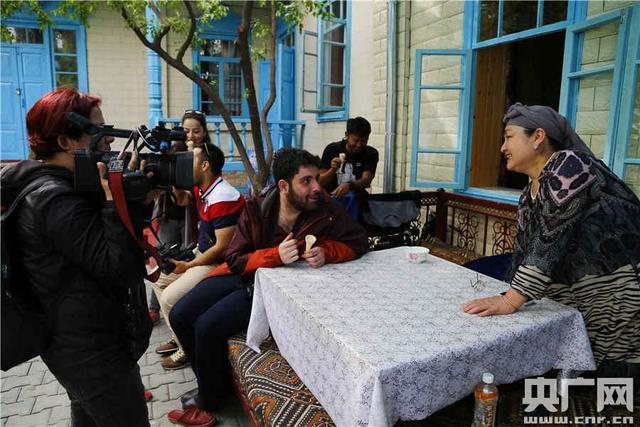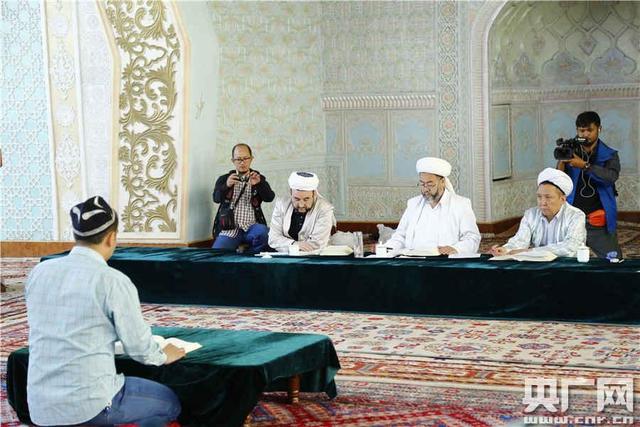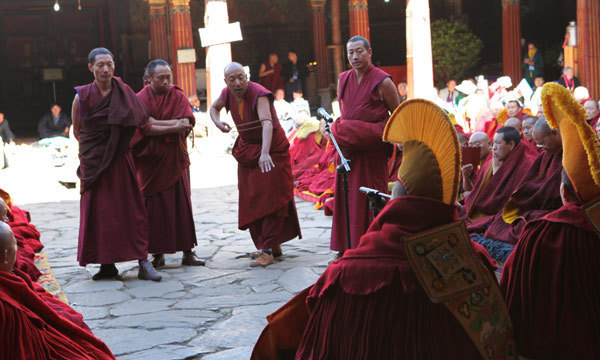Foreign journalists search for "tense atmosphere" in Xinjiang, results unexpected
On August 5, the Xinjiang Uighur Autonomous Region officially released local anti-terrorism legislation, which had been in effect since August 1. Previously, several foreign journalists have been entering Xinjiang, traveling all around the region to conduct interviews. What did they find in this area which is frequently referred to as a “tense atmosphere” by the foreign media?

Foreign journalists take a group photo with students from the Xinjiang Arts Institute.
Iranian State Television correspondent Ali Reza: “Xinjiang is a multi-ethnic area. The Chinese government has implemented several policies beneficial to ethnic minorities, and the minorities are very satisfied with the Chinese government. After what I’ve seen and heard over the past few days, I believe the notion is an unfounded rumor that the Chinese government will not allow Muslims to observe Ramadan.”
Malaysia Star newspaper has a report which goes like: “The modern lifestyle is very popular among young people. Some people live stable lives in government-constructed villages, while others live and work in large cities and towns. The government promotes Kazak and Uighur families to open their homes to tourists and increase their incomes through the development of rural tourism.

Foreign journalists interact with residents in Yining city.
Singapore’s Sunday Straits Times newspaper published this quote: “During the serious violence in Xinjiang, Alam Jiang, a hotel chef inYining, felt that his colleagues of other ethnicities were against him. But over the past two years, the situation has subsided, and work relations have improved. His salary has increased from 2,400 yuan to 4,700 yuan. He said, ‘The government has invested a lot of money to help Xinjiang develop, building houses and improving people’s lives.’”
West Australia newspaper journalist Mallabone Mark James: “I never imagined the speed of development here was so high, and that the ethnic culture here is so well protected. Originally I thought ordinary people could not live in the neighborhood buildings I saw in Urumqi, but after a few days I realized other cities also have similar neighborhoods, many of which were better than the neighborhood I interviewed in.”
Voice of America Beijing correspondent Ye Bing: “We interviewed people in Urumqi, Ili, Bole, and Turpan, at the Xinjiang Islamic Institute, mosques, in Yining city, at the port of Horgos, and on the streets. Wherever we went, it was generally stable, and we didn’t see anything out of the ordinary. In some streets and courtyards, we saw poster slogans that emphasized ethnic unity, harmony, and stability.”

Foreign journalists conduct interviews at the Xinjiang Islamic Institute.
Turkish National Radio reporter Gokhan Gocmen: “After seeing students sitting for their graduation exams and studying the Koran at the Xinjiang Islamic Institute, I felt that Xinjiang people have full religious freedom.”
French reporter Maxime Vivas: “While interviewing in Xinjiang, I saw the Urumqi high-speed rail station, which is more beautiful than some high-speed rail stations in Europe. In Kashgar, I saw people living and working in peaceful conditions. InKezhou, I saw a very modern port. The people of Xinjiang live very happy lives, and the smiles on their faces are proof of this.”
Your Comment
Name E-mailRelated News
-
;
-
-

-
Govt line on religions wins support from faith leaders
Religious leaders and scholars in China have voiced support for the government's stance on religions outlined by President Xi Jinping at a top-level conference.
-
-
-

-
Buddhists in Tibet have faith in their religion and state
Drolma Yangkyi's first errand every morning is to change the offering water and tea and burn incense in front of the religious offering table.
-
-
-

-
Religion on the plateau
The article shows something people need to know about religion on the Qinghai-Tibet Plateau.
-
Based in Lhasa, Tibet Vista is a Tibet travel agency that specialized in Tibet permit, and Tibet tours for both private and group travelers at a local price!
•4 Days Lhasa City Group Tour from USD 460 •8 Days Everest Base Camp Group Tour from USD 850 •15 Days Mt.Kailash Group Tour from USD 1780 •2016 Tibet Train Tours from Beijing, Shanghai, Chengdu, Xining,etc










